Rachael Gunn, better known by her stage name Raygun, is an Australian B-girl who has bowed out on her own terms after her stunning cameo at the Olympics in Paris.
However, the first Olympic break dancer from Australia has responded to those who have criticized her performance at Paris 24, where she was eliminated at the round-robin stage and did not receive a point from the judges.
Wearing her Australia team uniform instead of the standard breaking gear, Gunn won plenty of admirers for her performance, which made a big impression and set her apart from the other breakers’ show.
Gunn remarked, “All of my moves are original,” when asked what inspired her performance. For me, creativity is very important. I go out there and I show my artistry.
It speaks to the judges occasionally and not at other times. My work reflects art, and I do what I do. That is the main focus of it.
Before he opened the event, legendary American rapper and Olympic enthusiast Snoop Dogg made a lot of noise around Place de la Concorde by performing a few of his own moves.

The athletes’ dynamic skills were undeniable; they are evaluated based on their inventiveness, charisma, technique, variety, musicality, and vocabulary—that is, the quantity and variety of their moves.
Before the elimination round and medals, competitors competed in three judged battles, each consisting of two 60-second routines, with two live DJs.
However, even Snoop, the unofficial Games mascot, had had enough with the five and a half hours of competition, and he left halfway through.
Manizha Talash, an Olympic refugee team breaker who was born in Afghanistan before leaving because of the Taliban, made a bold political statement during her round by revealing a cape bearing the words “Free Afghan Women,” to the cheers of her Dutch opponent India Sardjoe.
In her opening match, Gunn faced off against American Logistx, but the Australian proved to be no match for her global rivals, failing to secure a point in any of the three matches, including one against 16-year-old French B-girl Syssy.
The 36-year-old, a university lecturer with a PhD in cultural studies, claimed that she tried to be more inventive because she knew she couldn’t match their athletic prowess with their spins, strength moves, and tricks.
“I wanted to use my creativity and strength to come out here and do something new and different,” Gunn remarked.
“I wanted to move differently, be artistic and creative because there aren’t many opportunities in life to do that on an international stage, and I knew that I would never be able to outperform these girls at what they do best—the dynamic and the power moves.
“I wanted to leave my mark in a different way because I was always the underdog.”

When asked if breaking should be an Olympic sport, Gunn said that it met the requirements.
What is a sport at the Olympics? This is really broad. What are the parallels between artistic swimming and dressage, as well as between the 100-meter sprint and the pentathlon?” she asked.
Breaking fits that description because it’s obviously athletic and demands a high level of commitment in many different areas. And it’s definitely generating a fresh degree of enthusiasm.
Ami Yuasa, a Japanese B-girl, defeated Nicka (Dominika Banevic) of Lithuania to win the gold medal in all three rounds of the competition.
“I want to say that breaking can also be a part of sports,” Yuasa remarked. “Breaking is my expression, an art.”
Even though the athletes will compete in Paris for medals, it’s possible that the winners will end up as obscure trivia questions because it’s highly unlikely that Brisbane and Los Angeles will host the event in 2028.
Given that breaking originated in the United States, the Oceania champion expressed disappointment that the American Olympic organizers had overlooked it.
Gunn stated, “I think that was maybe a little premature because it was disappointing that it was decided before we’d even had a chance to show it.”
“I wonder if they’re feeling bad about themselves right now, especially since they have some excellent American breakers who deserve a spot on the podium. However, because breaking is such a strong culture, it’s not over yet.
On Saturday, 16-year-old Australian B-boy Jeff Dunne, also referred to as “J Attack,” will compete in the men’s division.
